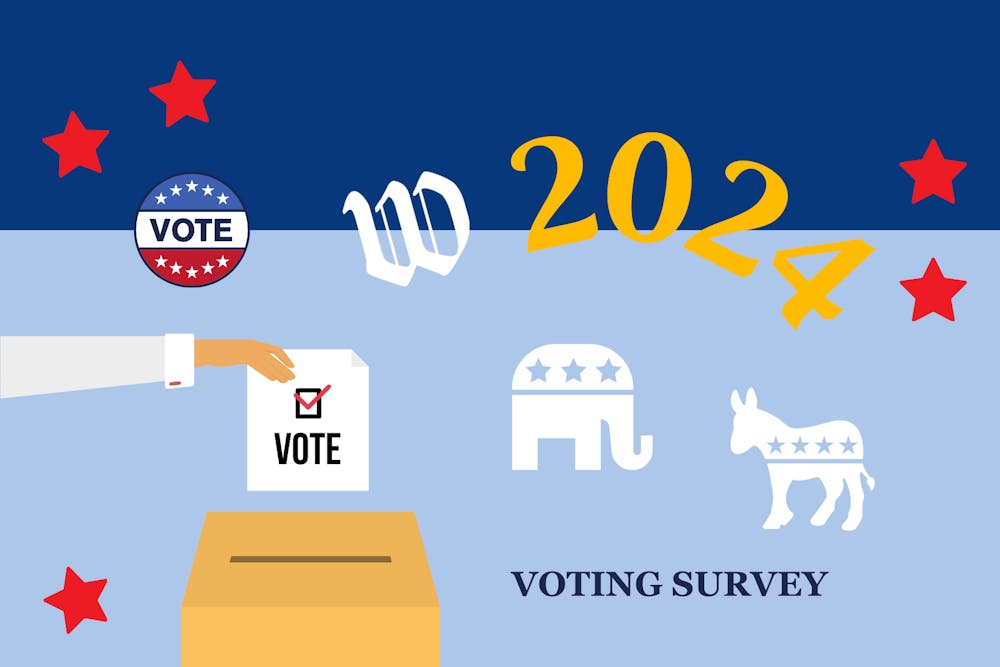With the 2024 presidential election just two weeks away, former U.S. President Donald Trump and U.S. Vice President Kamala Harris are neck and neck, with the latest NBC poll showing 48% support for both candidates. To understand how Emory University students view this election, The Emory Wheel conducted a poll surveying students on their political affiliation, voting plans and motivations to head to the ballot box. In total, 100 students responded to the survey, representing just over 1% of the undergraduate population.
The Wheel publicized the survey in GroupMe chats, the Oct. 9 print edition and social media to avoid sampling bias. However, the survey does not account for response bias, and the Wheel did not use random sampling.
Associate Professor of Political Science Zachary Peskowitz provided insight into the data collected. He noted that an “opt-in” survey could have potential biases, as “politically engaged and motivated students are more likely to participate.”
Results were collected from 39 first-years, 37 sophomores, 10 juniors and 14 seniors. Among the respondents, 40% identified as very liberal, 44% as moderately liberal, 8% as moderate, 6% as moderately conservative and 2% as very conservative.
Despite the close results in the national poll of Trump and Harris, an Inside Higher Ed survey from earlier this month showed that 57% of college students favor Harris, compared to 19% who favor Trump. In the Wheel’s survey, 83% of respondents stated that they plan to vote for Harris, and 9% plan to vote for Trump.
Five survey participants stated they intend to vote for Jill Stein or Claudia De la Cruz. Stein and De la Cruz have garnered support due to their pro-Palestinian stances.
The top priority for students was abortion rights, with 25% of respondents stating this as a reason they were voting, followed by 12% for LGBTQ+ rights. Additionally, 9% are voting due to ongoing conflicts in the Middle East, and 12% of respondents listed the economy as a motivator.
Further, 5% cited that they plan to vote in the election to uphold or participate in democracy. Additionally, 8% of respondents stated they were voting to keep Trump from returning to office.
“Voting is my civic duty and it’s significant to me as this is my first election I am able to vote in,” a student wrote. “But also, I am concerned about the state of our nation.”
In terms of voting registration, 75% of respondents stated they are registered to vote in Georgia, whereas 23% are registered in another state. In Georgia, early voting turnout has reached a record high, with over 1.7 million votes. Nearly 19 million early voting ballots have been cast nationwide as of Oct. 22.
Although Georgia has had a record turnout, Peskowitz added the younger generation votes at lower rates than older people. In the previous presidential election, people under the age of 30 represented just 15% of all 2020 voters, according to a poll by the Pew Research Center.
Peskowitz discussed some challenges students face when voting, such as traveling to their home state or requesting an absentee ballot. Although 98% of respondents indicated that they plan to vote, Peskowitz expressed skepticism that this will be representative of the true turnout among students.
Georgia is one of the critical states in this election. In 2020, U.S. President Joe Biden won the state with less than a 0.3% margin, the closest race in the country that election. It was the first time Georgia had voted for the Democratic nominee in almost 30 years.
“The margins are going to be so tight in all the seven battleground states that very small swings in turnout or persuasion could absolutely swing a battleground state and swing the entire election,” Peskowitz said.










